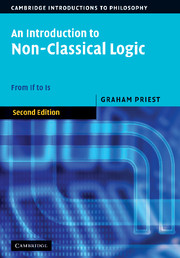Book contents
- Frontmatter
- Contents
- Preface to the First Edition
- Preface to the Second Edition
- Mathematical Prolegomenon
- Part I Propositional Logic
- 1 Classical Logic and the Material Conditional
- 2 Basic Modal Logic
- 3 Normal Modal Logics
- 4 Non-normal Modal Logics; Strict Conditionals
- 5 Conditional Logics
- 6 Intuitionist Logic
- 7 Many-valued Logics
- 8 First Degree Entailment
- 9 Logics with Gaps, Gluts and Worlds
- 10 Relevant Logics
- 11 Fuzzy Logics
- 11a Appendix: Many-valued Modal Logics
- Postscript: An Historical Perspective on Conditionals
- Part II Quantification and Identity
- Postscript: A Methodological Coda
- References
- Index of Names
- Index of Subjects
4 - Non-normal Modal Logics; Strict Conditionals
Published online by Cambridge University Press: 05 June 2012
- Frontmatter
- Contents
- Preface to the First Edition
- Preface to the Second Edition
- Mathematical Prolegomenon
- Part I Propositional Logic
- 1 Classical Logic and the Material Conditional
- 2 Basic Modal Logic
- 3 Normal Modal Logics
- 4 Non-normal Modal Logics; Strict Conditionals
- 5 Conditional Logics
- 6 Intuitionist Logic
- 7 Many-valued Logics
- 8 First Degree Entailment
- 9 Logics with Gaps, Gluts and Worlds
- 10 Relevant Logics
- 11 Fuzzy Logics
- 11a Appendix: Many-valued Modal Logics
- Postscript: An Historical Perspective on Conditionals
- Part II Quantification and Identity
- Postscript: A Methodological Coda
- References
- Index of Names
- Index of Subjects
Summary
Introduction
4.1.1 In this chapter we look at some systems of modal logic weaker than K (and so non-normal). These involve so-called non-normal worlds. Nonnormal worlds are worlds where the truth conditions of modal operators are different.
4.1.2 We are then in a position to return to the issue of the conditional, and have a look at an account of a modal conditional called the strict conditional.
Non-normal Worlds
4.2.1 Let us start by looking at the technicalities concerning non-normality. In due course we will be able to discuss what they mean.
4.2.2 A non-normal interpretation of a modal propositional language is a structure, 〈W, N, R, ν〉, where W, R and ν are as in previous chapters, and N ⊆ W. Worlds in N are called normal. Worlds in W – N (the worlds that are not normal) are called non-normal.
4.2.3 The truth conditions for the truth functions, ∧, ∨, ¬, etc. are the same as before (2.3.4). The truth conditions for □ and ◇ at normal worlds are also as before (2.3.5). But if w is non-normal:
νw(□A) = 0
νw(◇A) = 1
In a sense, at non-normal worlds, everything is possible, and nothing is necessary.
4.2.4 Note that at every world, w, ¬□A and ◇¬A still have the same truth value, as do ¬◇A and □¬A. We saw this to be the case for normal worlds in 2.3.9 and 2.3.10.
Information
- Type
- Chapter
- Information
- An Introduction to Non-Classical LogicFrom If to Is, pp. 64 - 81Publisher: Cambridge University PressPrint publication year: 2008
